Report: Monetary, Fiscal, and Global Factors Impacting UK Business
VerifiedAdded on 2020/10/04
|14
|4506
|257
Report
AI Summary
This report provides a comprehensive analysis of the UK business environment, examining the influence of monetary and fiscal policies, along with regional and global factors. The report delves into the specifics of monetary policy, including interest rate management and its impact on investment, consumer spending, and credit availability. It also explores fiscal policy, detailing the effects of taxation, government spending, and unemployment rates on business activities. Furthermore, the report discusses the advantages and disadvantages of both monetary and fiscal policies, offering a balanced perspective on their effectiveness. The analysis considers how these policies shape economic cycles and influence business performance, providing valuable insights for understanding the complexities of the UK business landscape. The report also contains sections on global and regional factors, which are essential for a complete understanding of the UK business environment.

Introduction to Business
Environment
Environment
Paraphrase This Document
Need a fresh take? Get an instant paraphrase of this document with our AI Paraphraser
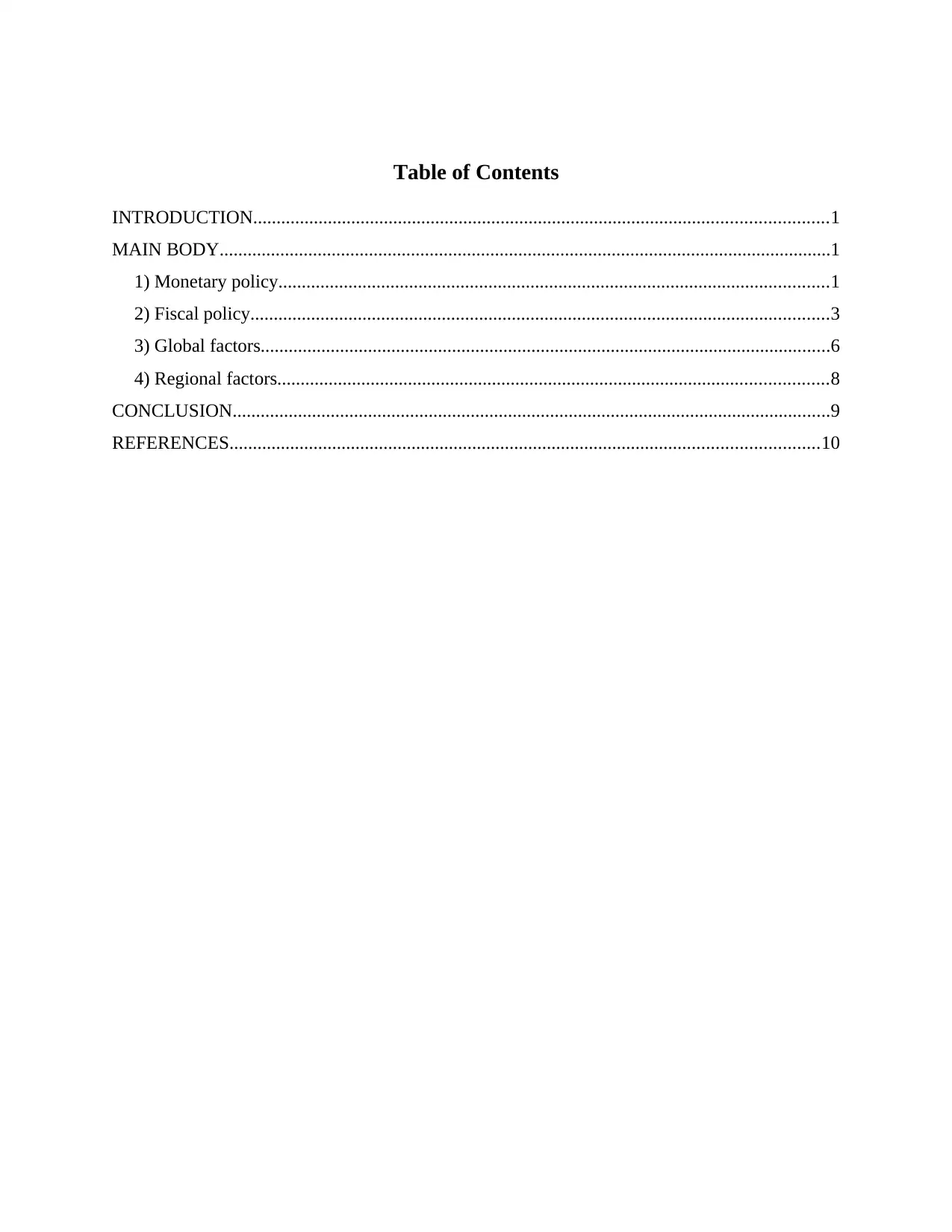
Table of Contents
INTRODUCTION...........................................................................................................................1
MAIN BODY...................................................................................................................................1
1) Monetary policy......................................................................................................................1
2) Fiscal policy............................................................................................................................3
3) Global factors..........................................................................................................................6
4) Regional factors......................................................................................................................8
CONCLUSION................................................................................................................................9
REFERENCES..............................................................................................................................10
INTRODUCTION...........................................................................................................................1
MAIN BODY...................................................................................................................................1
1) Monetary policy......................................................................................................................1
2) Fiscal policy............................................................................................................................3
3) Global factors..........................................................................................................................6
4) Regional factors......................................................................................................................8
CONCLUSION................................................................................................................................9
REFERENCES..............................................................................................................................10
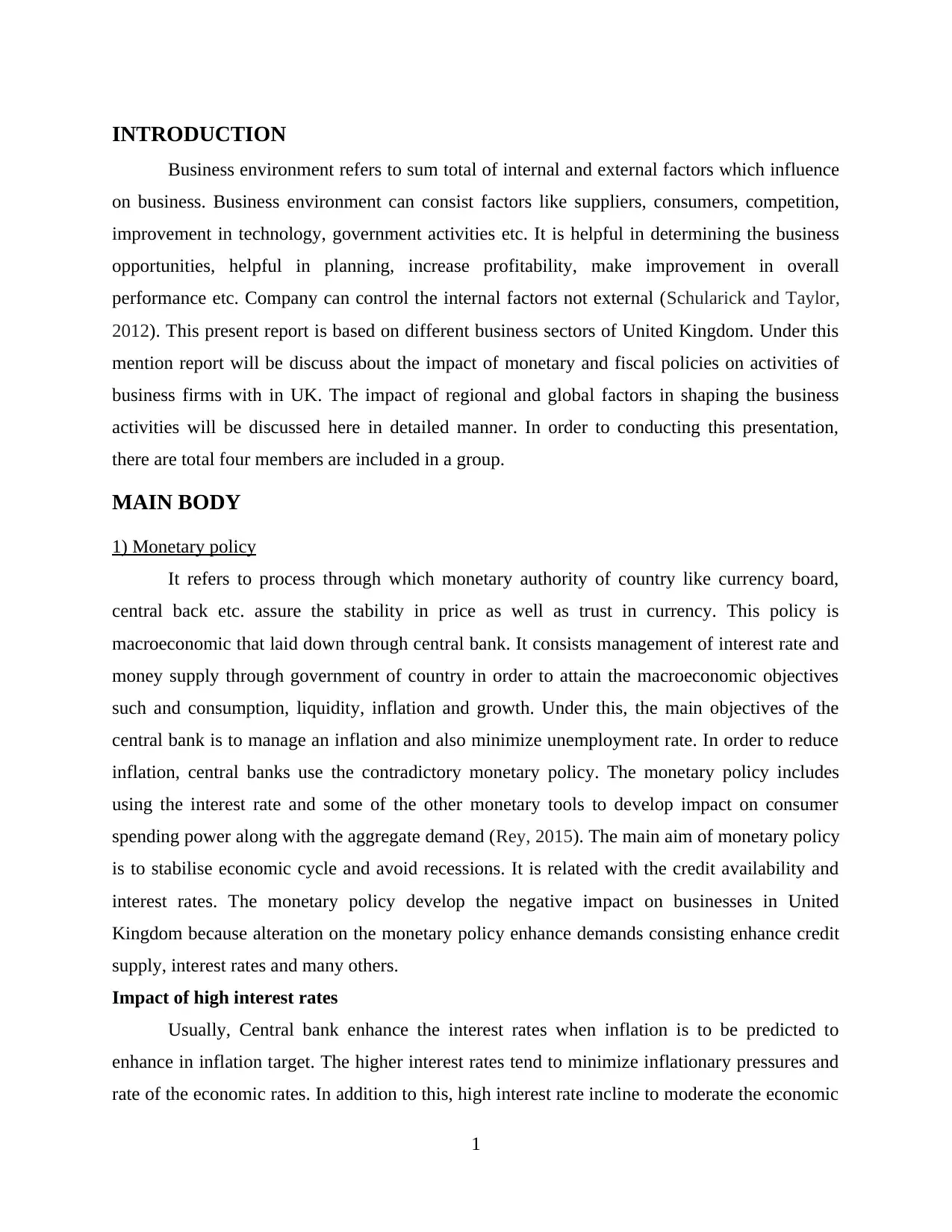
INTRODUCTION
Business environment refers to sum total of internal and external factors which influence
on business. Business environment can consist factors like suppliers, consumers, competition,
improvement in technology, government activities etc. It is helpful in determining the business
opportunities, helpful in planning, increase profitability, make improvement in overall
performance etc. Company can control the internal factors not external (Schularick and Taylor,
2012). This present report is based on different business sectors of United Kingdom. Under this
mention report will be discuss about the impact of monetary and fiscal policies on activities of
business firms with in UK. The impact of regional and global factors in shaping the business
activities will be discussed here in detailed manner. In order to conducting this presentation,
there are total four members are included in a group.
MAIN BODY
1) Monetary policy
It refers to process through which monetary authority of country like currency board,
central back etc. assure the stability in price as well as trust in currency. This policy is
macroeconomic that laid down through central bank. It consists management of interest rate and
money supply through government of country in order to attain the macroeconomic objectives
such and consumption, liquidity, inflation and growth. Under this, the main objectives of the
central bank is to manage an inflation and also minimize unemployment rate. In order to reduce
inflation, central banks use the contradictory monetary policy. The monetary policy includes
using the interest rate and some of the other monetary tools to develop impact on consumer
spending power along with the aggregate demand (Rey, 2015). The main aim of monetary policy
is to stabilise economic cycle and avoid recessions. It is related with the credit availability and
interest rates. The monetary policy develop the negative impact on businesses in United
Kingdom because alteration on the monetary policy enhance demands consisting enhance credit
supply, interest rates and many others.
Impact of high interest rates
Usually, Central bank enhance the interest rates when inflation is to be predicted to
enhance in inflation target. The higher interest rates tend to minimize inflationary pressures and
rate of the economic rates. In addition to this, high interest rate incline to moderate the economic
1
Business environment refers to sum total of internal and external factors which influence
on business. Business environment can consist factors like suppliers, consumers, competition,
improvement in technology, government activities etc. It is helpful in determining the business
opportunities, helpful in planning, increase profitability, make improvement in overall
performance etc. Company can control the internal factors not external (Schularick and Taylor,
2012). This present report is based on different business sectors of United Kingdom. Under this
mention report will be discuss about the impact of monetary and fiscal policies on activities of
business firms with in UK. The impact of regional and global factors in shaping the business
activities will be discussed here in detailed manner. In order to conducting this presentation,
there are total four members are included in a group.
MAIN BODY
1) Monetary policy
It refers to process through which monetary authority of country like currency board,
central back etc. assure the stability in price as well as trust in currency. This policy is
macroeconomic that laid down through central bank. It consists management of interest rate and
money supply through government of country in order to attain the macroeconomic objectives
such and consumption, liquidity, inflation and growth. Under this, the main objectives of the
central bank is to manage an inflation and also minimize unemployment rate. In order to reduce
inflation, central banks use the contradictory monetary policy. The monetary policy includes
using the interest rate and some of the other monetary tools to develop impact on consumer
spending power along with the aggregate demand (Rey, 2015). The main aim of monetary policy
is to stabilise economic cycle and avoid recessions. It is related with the credit availability and
interest rates. The monetary policy develop the negative impact on businesses in United
Kingdom because alteration on the monetary policy enhance demands consisting enhance credit
supply, interest rates and many others.
Impact of high interest rates
Usually, Central bank enhance the interest rates when inflation is to be predicted to
enhance in inflation target. The higher interest rates tend to minimize inflationary pressures and
rate of the economic rates. In addition to this, high interest rate incline to moderate the economic
1
⊘ This is a preview!⊘
Do you want full access?
Subscribe today to unlock all pages.

Trusted by 1+ million students worldwide
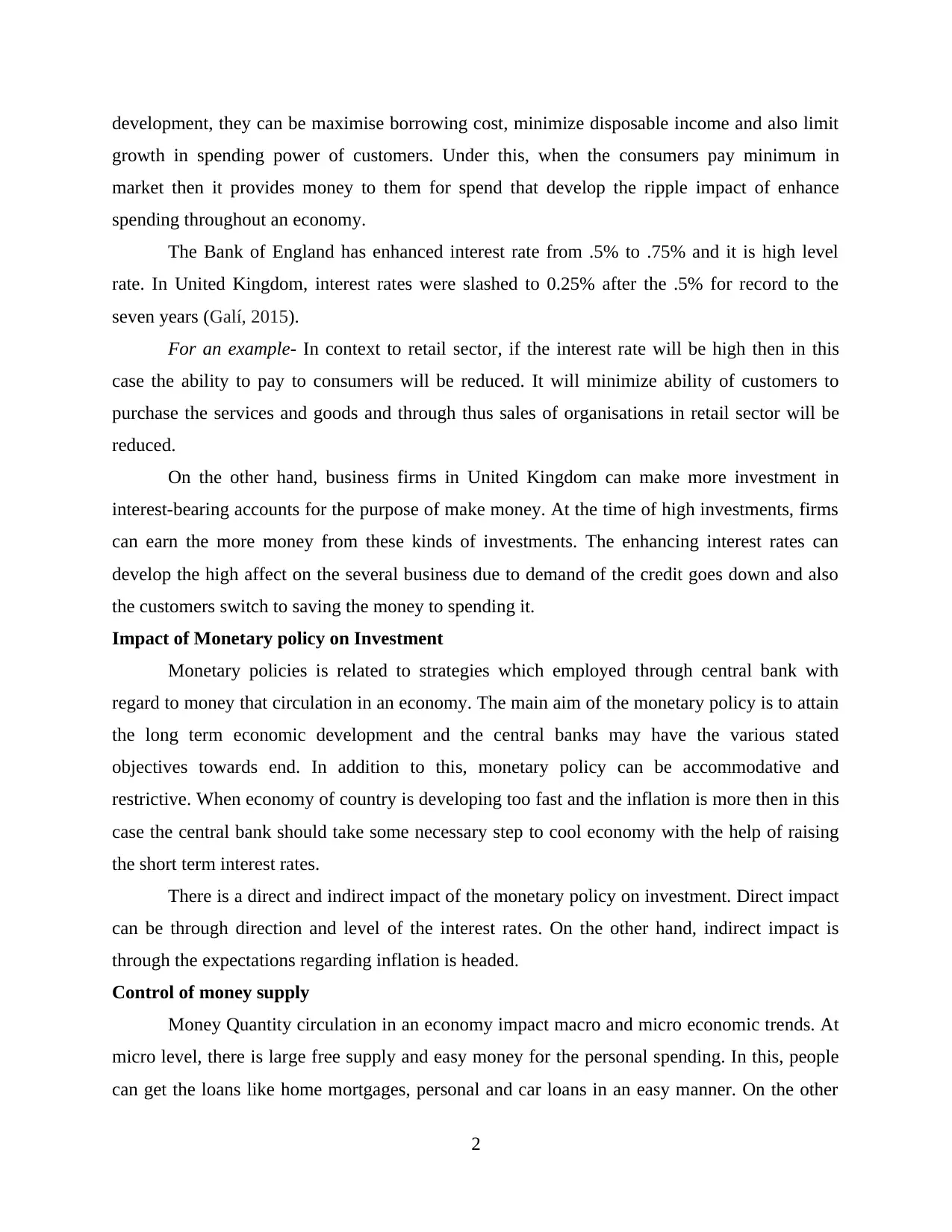
development, they can be maximise borrowing cost, minimize disposable income and also limit
growth in spending power of customers. Under this, when the consumers pay minimum in
market then it provides money to them for spend that develop the ripple impact of enhance
spending throughout an economy.
The Bank of England has enhanced interest rate from .5% to .75% and it is high level
rate. In United Kingdom, interest rates were slashed to 0.25% after the .5% for record to the
seven years (Galí, 2015).
For an example- In context to retail sector, if the interest rate will be high then in this
case the ability to pay to consumers will be reduced. It will minimize ability of customers to
purchase the services and goods and through thus sales of organisations in retail sector will be
reduced.
On the other hand, business firms in United Kingdom can make more investment in
interest-bearing accounts for the purpose of make money. At the time of high investments, firms
can earn the more money from these kinds of investments. The enhancing interest rates can
develop the high affect on the several business due to demand of the credit goes down and also
the customers switch to saving the money to spending it.
Impact of Monetary policy on Investment
Monetary policies is related to strategies which employed through central bank with
regard to money that circulation in an economy. The main aim of the monetary policy is to attain
the long term economic development and the central banks may have the various stated
objectives towards end. In addition to this, monetary policy can be accommodative and
restrictive. When economy of country is developing too fast and the inflation is more then in this
case the central bank should take some necessary step to cool economy with the help of raising
the short term interest rates.
There is a direct and indirect impact of the monetary policy on investment. Direct impact
can be through direction and level of the interest rates. On the other hand, indirect impact is
through the expectations regarding inflation is headed.
Control of money supply
Money Quantity circulation in an economy impact macro and micro economic trends. At
micro level, there is large free supply and easy money for the personal spending. In this, people
can get the loans like home mortgages, personal and car loans in an easy manner. On the other
2
growth in spending power of customers. Under this, when the consumers pay minimum in
market then it provides money to them for spend that develop the ripple impact of enhance
spending throughout an economy.
The Bank of England has enhanced interest rate from .5% to .75% and it is high level
rate. In United Kingdom, interest rates were slashed to 0.25% after the .5% for record to the
seven years (Galí, 2015).
For an example- In context to retail sector, if the interest rate will be high then in this
case the ability to pay to consumers will be reduced. It will minimize ability of customers to
purchase the services and goods and through thus sales of organisations in retail sector will be
reduced.
On the other hand, business firms in United Kingdom can make more investment in
interest-bearing accounts for the purpose of make money. At the time of high investments, firms
can earn the more money from these kinds of investments. The enhancing interest rates can
develop the high affect on the several business due to demand of the credit goes down and also
the customers switch to saving the money to spending it.
Impact of Monetary policy on Investment
Monetary policies is related to strategies which employed through central bank with
regard to money that circulation in an economy. The main aim of the monetary policy is to attain
the long term economic development and the central banks may have the various stated
objectives towards end. In addition to this, monetary policy can be accommodative and
restrictive. When economy of country is developing too fast and the inflation is more then in this
case the central bank should take some necessary step to cool economy with the help of raising
the short term interest rates.
There is a direct and indirect impact of the monetary policy on investment. Direct impact
can be through direction and level of the interest rates. On the other hand, indirect impact is
through the expectations regarding inflation is headed.
Control of money supply
Money Quantity circulation in an economy impact macro and micro economic trends. At
micro level, there is large free supply and easy money for the personal spending. In this, people
can get the loans like home mortgages, personal and car loans in an easy manner. On the other
2
Paraphrase This Document
Need a fresh take? Get an instant paraphrase of this document with our AI Paraphraser
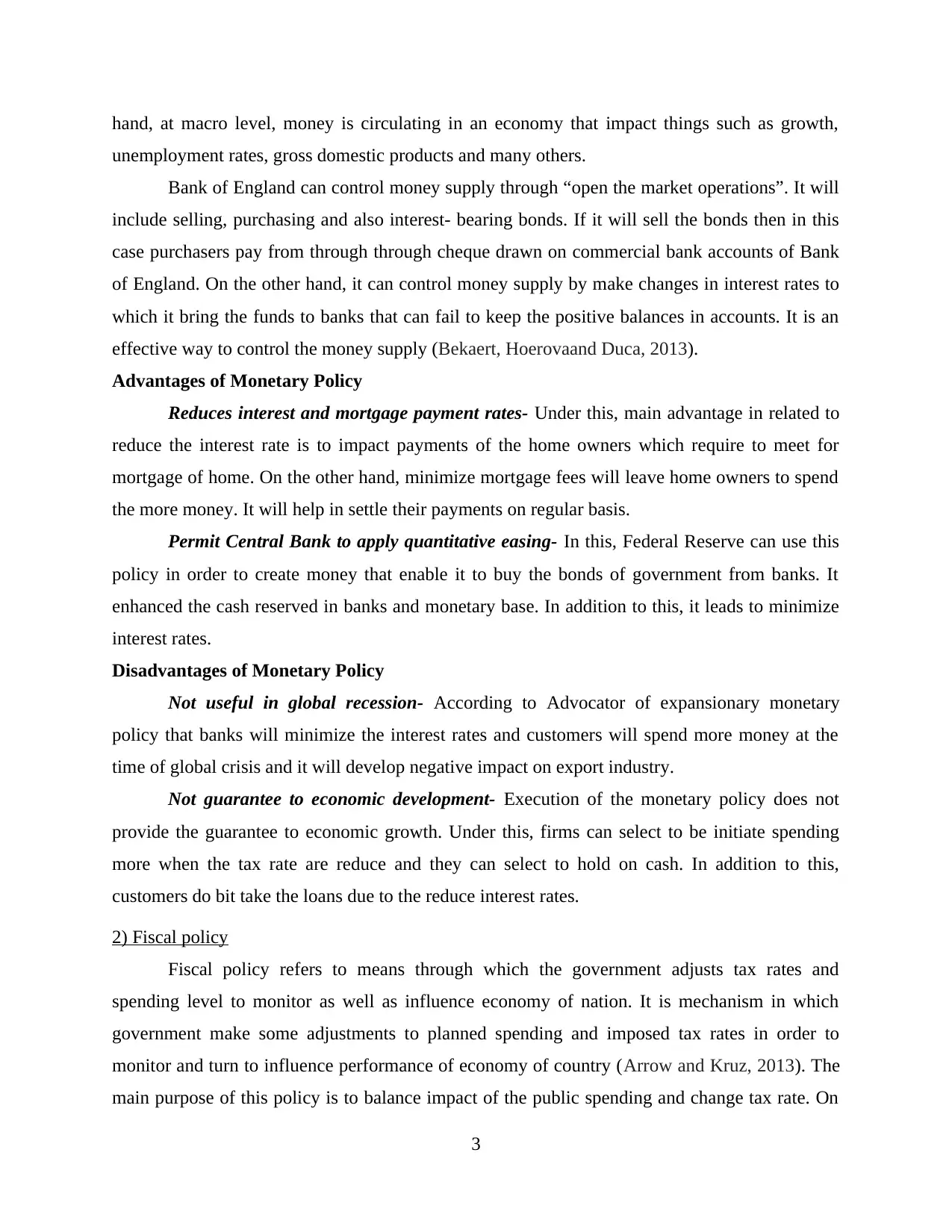
hand, at macro level, money is circulating in an economy that impact things such as growth,
unemployment rates, gross domestic products and many others.
Bank of England can control money supply through “open the market operations”. It will
include selling, purchasing and also interest- bearing bonds. If it will sell the bonds then in this
case purchasers pay from through through cheque drawn on commercial bank accounts of Bank
of England. On the other hand, it can control money supply by make changes in interest rates to
which it bring the funds to banks that can fail to keep the positive balances in accounts. It is an
effective way to control the money supply (Bekaert, Hoerovaand Duca, 2013).
Advantages of Monetary Policy
Reduces interest and mortgage payment rates- Under this, main advantage in related to
reduce the interest rate is to impact payments of the home owners which require to meet for
mortgage of home. On the other hand, minimize mortgage fees will leave home owners to spend
the more money. It will help in settle their payments on regular basis.
Permit Central Bank to apply quantitative easing- In this, Federal Reserve can use this
policy in order to create money that enable it to buy the bonds of government from banks. It
enhanced the cash reserved in banks and monetary base. In addition to this, it leads to minimize
interest rates.
Disadvantages of Monetary Policy
Not useful in global recession- According to Advocator of expansionary monetary
policy that banks will minimize the interest rates and customers will spend more money at the
time of global crisis and it will develop negative impact on export industry.
Not guarantee to economic development- Execution of the monetary policy does not
provide the guarantee to economic growth. Under this, firms can select to be initiate spending
more when the tax rate are reduce and they can select to hold on cash. In addition to this,
customers do bit take the loans due to the reduce interest rates.
2) Fiscal policy
Fiscal policy refers to means through which the government adjusts tax rates and
spending level to monitor as well as influence economy of nation. It is mechanism in which
government make some adjustments to planned spending and imposed tax rates in order to
monitor and turn to influence performance of economy of country (Arrow and Kruz, 2013). The
main purpose of this policy is to balance impact of the public spending and change tax rate. On
3
unemployment rates, gross domestic products and many others.
Bank of England can control money supply through “open the market operations”. It will
include selling, purchasing and also interest- bearing bonds. If it will sell the bonds then in this
case purchasers pay from through through cheque drawn on commercial bank accounts of Bank
of England. On the other hand, it can control money supply by make changes in interest rates to
which it bring the funds to banks that can fail to keep the positive balances in accounts. It is an
effective way to control the money supply (Bekaert, Hoerovaand Duca, 2013).
Advantages of Monetary Policy
Reduces interest and mortgage payment rates- Under this, main advantage in related to
reduce the interest rate is to impact payments of the home owners which require to meet for
mortgage of home. On the other hand, minimize mortgage fees will leave home owners to spend
the more money. It will help in settle their payments on regular basis.
Permit Central Bank to apply quantitative easing- In this, Federal Reserve can use this
policy in order to create money that enable it to buy the bonds of government from banks. It
enhanced the cash reserved in banks and monetary base. In addition to this, it leads to minimize
interest rates.
Disadvantages of Monetary Policy
Not useful in global recession- According to Advocator of expansionary monetary
policy that banks will minimize the interest rates and customers will spend more money at the
time of global crisis and it will develop negative impact on export industry.
Not guarantee to economic development- Execution of the monetary policy does not
provide the guarantee to economic growth. Under this, firms can select to be initiate spending
more when the tax rate are reduce and they can select to hold on cash. In addition to this,
customers do bit take the loans due to the reduce interest rates.
2) Fiscal policy
Fiscal policy refers to means through which the government adjusts tax rates and
spending level to monitor as well as influence economy of nation. It is mechanism in which
government make some adjustments to planned spending and imposed tax rates in order to
monitor and turn to influence performance of economy of country (Arrow and Kruz, 2013). The
main purpose of this policy is to balance impact of the public spending and change tax rate. On
3
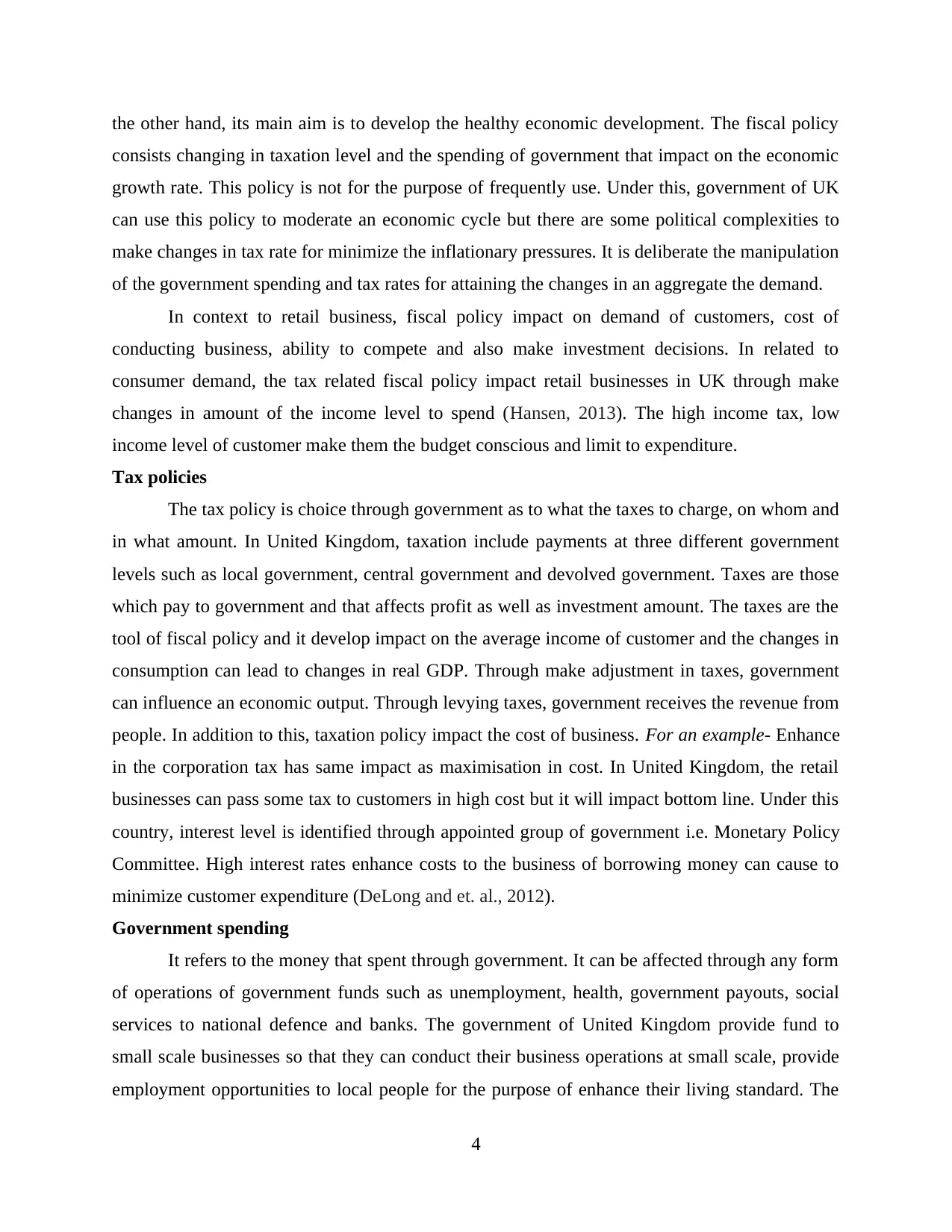
the other hand, its main aim is to develop the healthy economic development. The fiscal policy
consists changing in taxation level and the spending of government that impact on the economic
growth rate. This policy is not for the purpose of frequently use. Under this, government of UK
can use this policy to moderate an economic cycle but there are some political complexities to
make changes in tax rate for minimize the inflationary pressures. It is deliberate the manipulation
of the government spending and tax rates for attaining the changes in an aggregate the demand.
In context to retail business, fiscal policy impact on demand of customers, cost of
conducting business, ability to compete and also make investment decisions. In related to
consumer demand, the tax related fiscal policy impact retail businesses in UK through make
changes in amount of the income level to spend (Hansen, 2013). The high income tax, low
income level of customer make them the budget conscious and limit to expenditure.
Tax policies
The tax policy is choice through government as to what the taxes to charge, on whom and
in what amount. In United Kingdom, taxation include payments at three different government
levels such as local government, central government and devolved government. Taxes are those
which pay to government and that affects profit as well as investment amount. The taxes are the
tool of fiscal policy and it develop impact on the average income of customer and the changes in
consumption can lead to changes in real GDP. Through make adjustment in taxes, government
can influence an economic output. Through levying taxes, government receives the revenue from
people. In addition to this, taxation policy impact the cost of business. For an example- Enhance
in the corporation tax has same impact as maximisation in cost. In United Kingdom, the retail
businesses can pass some tax to customers in high cost but it will impact bottom line. Under this
country, interest level is identified through appointed group of government i.e. Monetary Policy
Committee. High interest rates enhance costs to the business of borrowing money can cause to
minimize customer expenditure (DeLong and et. al., 2012).
Government spending
It refers to the money that spent through government. It can be affected through any form
of operations of government funds such as unemployment, health, government payouts, social
services to national defence and banks. The government of United Kingdom provide fund to
small scale businesses so that they can conduct their business operations at small scale, provide
employment opportunities to local people for the purpose of enhance their living standard. The
4
consists changing in taxation level and the spending of government that impact on the economic
growth rate. This policy is not for the purpose of frequently use. Under this, government of UK
can use this policy to moderate an economic cycle but there are some political complexities to
make changes in tax rate for minimize the inflationary pressures. It is deliberate the manipulation
of the government spending and tax rates for attaining the changes in an aggregate the demand.
In context to retail business, fiscal policy impact on demand of customers, cost of
conducting business, ability to compete and also make investment decisions. In related to
consumer demand, the tax related fiscal policy impact retail businesses in UK through make
changes in amount of the income level to spend (Hansen, 2013). The high income tax, low
income level of customer make them the budget conscious and limit to expenditure.
Tax policies
The tax policy is choice through government as to what the taxes to charge, on whom and
in what amount. In United Kingdom, taxation include payments at three different government
levels such as local government, central government and devolved government. Taxes are those
which pay to government and that affects profit as well as investment amount. The taxes are the
tool of fiscal policy and it develop impact on the average income of customer and the changes in
consumption can lead to changes in real GDP. Through make adjustment in taxes, government
can influence an economic output. Through levying taxes, government receives the revenue from
people. In addition to this, taxation policy impact the cost of business. For an example- Enhance
in the corporation tax has same impact as maximisation in cost. In United Kingdom, the retail
businesses can pass some tax to customers in high cost but it will impact bottom line. Under this
country, interest level is identified through appointed group of government i.e. Monetary Policy
Committee. High interest rates enhance costs to the business of borrowing money can cause to
minimize customer expenditure (DeLong and et. al., 2012).
Government spending
It refers to the money that spent through government. It can be affected through any form
of operations of government funds such as unemployment, health, government payouts, social
services to national defence and banks. The government of United Kingdom provide fund to
small scale businesses so that they can conduct their business operations at small scale, provide
employment opportunities to local people for the purpose of enhance their living standard. The
4
⊘ This is a preview!⊘
Do you want full access?
Subscribe today to unlock all pages.

Trusted by 1+ million students worldwide
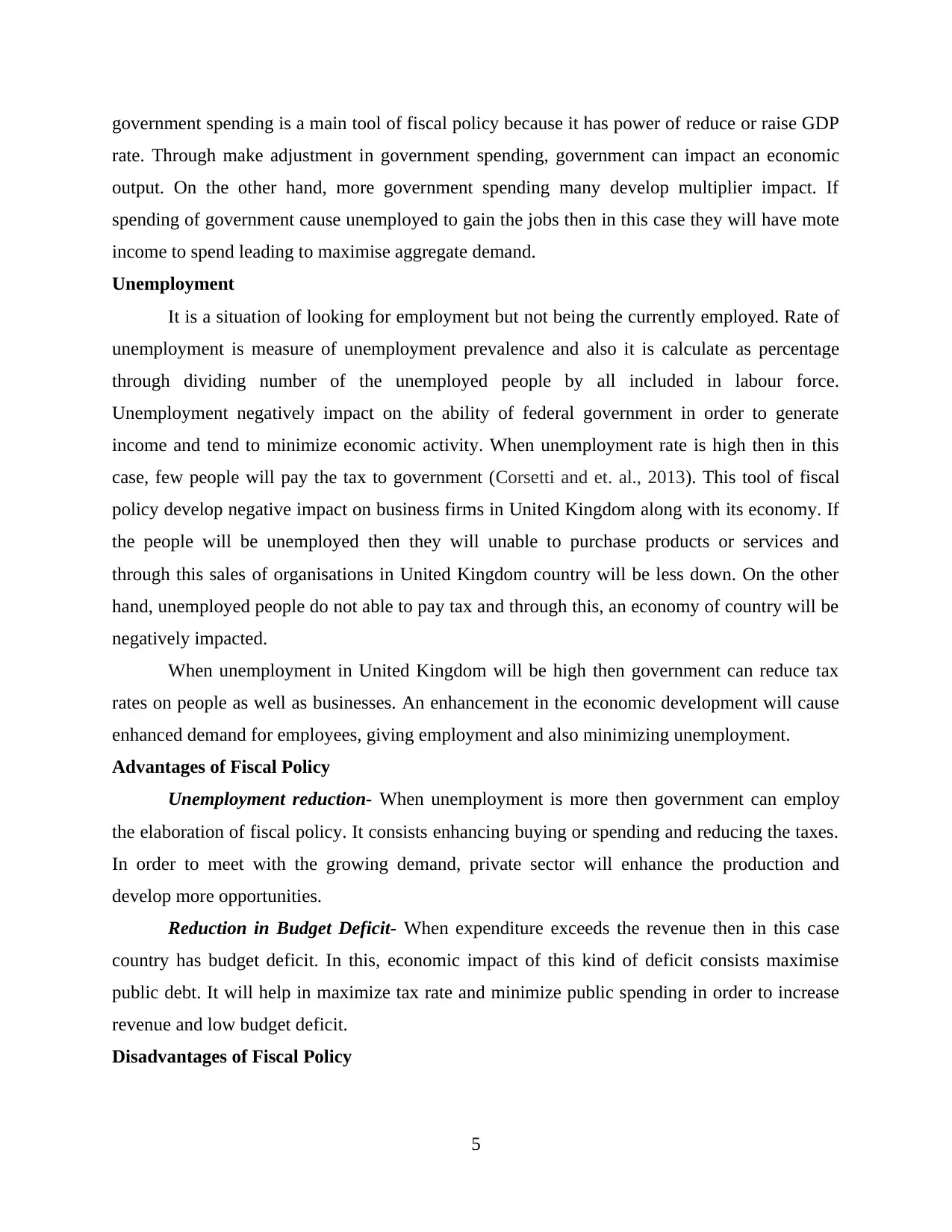
government spending is a main tool of fiscal policy because it has power of reduce or raise GDP
rate. Through make adjustment in government spending, government can impact an economic
output. On the other hand, more government spending many develop multiplier impact. If
spending of government cause unemployed to gain the jobs then in this case they will have mote
income to spend leading to maximise aggregate demand.
Unemployment
It is a situation of looking for employment but not being the currently employed. Rate of
unemployment is measure of unemployment prevalence and also it is calculate as percentage
through dividing number of the unemployed people by all included in labour force.
Unemployment negatively impact on the ability of federal government in order to generate
income and tend to minimize economic activity. When unemployment rate is high then in this
case, few people will pay the tax to government (Corsetti and et. al., 2013). This tool of fiscal
policy develop negative impact on business firms in United Kingdom along with its economy. If
the people will be unemployed then they will unable to purchase products or services and
through this sales of organisations in United Kingdom country will be less down. On the other
hand, unemployed people do not able to pay tax and through this, an economy of country will be
negatively impacted.
When unemployment in United Kingdom will be high then government can reduce tax
rates on people as well as businesses. An enhancement in the economic development will cause
enhanced demand for employees, giving employment and also minimizing unemployment.
Advantages of Fiscal Policy
Unemployment reduction- When unemployment is more then government can employ
the elaboration of fiscal policy. It consists enhancing buying or spending and reducing the taxes.
In order to meet with the growing demand, private sector will enhance the production and
develop more opportunities.
Reduction in Budget Deficit- When expenditure exceeds the revenue then in this case
country has budget deficit. In this, economic impact of this kind of deficit consists maximise
public debt. It will help in maximize tax rate and minimize public spending in order to increase
revenue and low budget deficit.
Disadvantages of Fiscal Policy
5
rate. Through make adjustment in government spending, government can impact an economic
output. On the other hand, more government spending many develop multiplier impact. If
spending of government cause unemployed to gain the jobs then in this case they will have mote
income to spend leading to maximise aggregate demand.
Unemployment
It is a situation of looking for employment but not being the currently employed. Rate of
unemployment is measure of unemployment prevalence and also it is calculate as percentage
through dividing number of the unemployed people by all included in labour force.
Unemployment negatively impact on the ability of federal government in order to generate
income and tend to minimize economic activity. When unemployment rate is high then in this
case, few people will pay the tax to government (Corsetti and et. al., 2013). This tool of fiscal
policy develop negative impact on business firms in United Kingdom along with its economy. If
the people will be unemployed then they will unable to purchase products or services and
through this sales of organisations in United Kingdom country will be less down. On the other
hand, unemployed people do not able to pay tax and through this, an economy of country will be
negatively impacted.
When unemployment in United Kingdom will be high then government can reduce tax
rates on people as well as businesses. An enhancement in the economic development will cause
enhanced demand for employees, giving employment and also minimizing unemployment.
Advantages of Fiscal Policy
Unemployment reduction- When unemployment is more then government can employ
the elaboration of fiscal policy. It consists enhancing buying or spending and reducing the taxes.
In order to meet with the growing demand, private sector will enhance the production and
develop more opportunities.
Reduction in Budget Deficit- When expenditure exceeds the revenue then in this case
country has budget deficit. In this, economic impact of this kind of deficit consists maximise
public debt. It will help in maximize tax rate and minimize public spending in order to increase
revenue and low budget deficit.
Disadvantages of Fiscal Policy
5
Paraphrase This Document
Need a fresh take? Get an instant paraphrase of this document with our AI Paraphraser
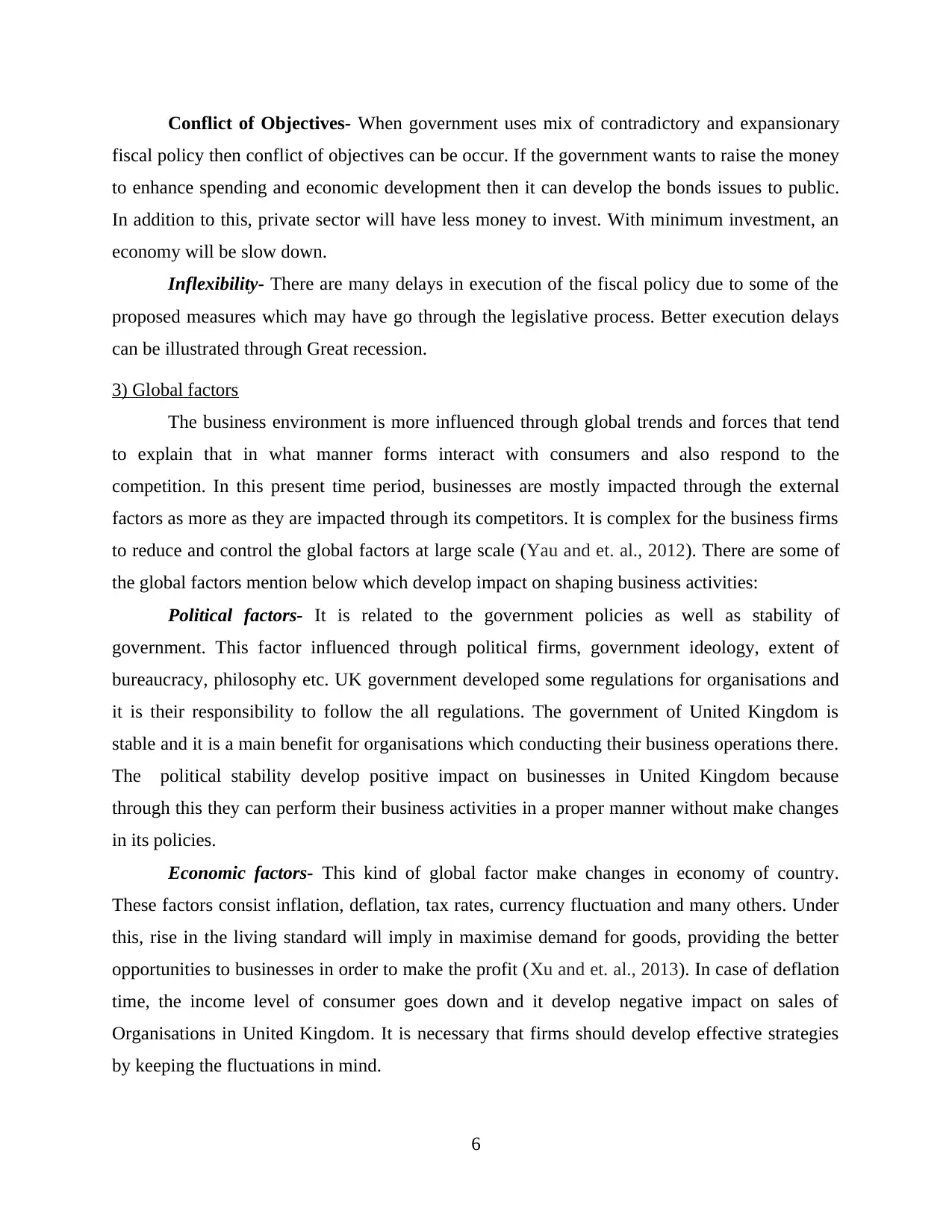
Conflict of Objectives- When government uses mix of contradictory and expansionary
fiscal policy then conflict of objectives can be occur. If the government wants to raise the money
to enhance spending and economic development then it can develop the bonds issues to public.
In addition to this, private sector will have less money to invest. With minimum investment, an
economy will be slow down.
Inflexibility- There are many delays in execution of the fiscal policy due to some of the
proposed measures which may have go through the legislative process. Better execution delays
can be illustrated through Great recession.
3) Global factors
The business environment is more influenced through global trends and forces that tend
to explain that in what manner forms interact with consumers and also respond to the
competition. In this present time period, businesses are mostly impacted through the external
factors as more as they are impacted through its competitors. It is complex for the business firms
to reduce and control the global factors at large scale (Yau and et. al., 2012). There are some of
the global factors mention below which develop impact on shaping business activities:
Political factors- It is related to the government policies as well as stability of
government. This factor influenced through political firms, government ideology, extent of
bureaucracy, philosophy etc. UK government developed some regulations for organisations and
it is their responsibility to follow the all regulations. The government of United Kingdom is
stable and it is a main benefit for organisations which conducting their business operations there.
The political stability develop positive impact on businesses in United Kingdom because
through this they can perform their business activities in a proper manner without make changes
in its policies.
Economic factors- This kind of global factor make changes in economy of country.
These factors consist inflation, deflation, tax rates, currency fluctuation and many others. Under
this, rise in the living standard will imply in maximise demand for goods, providing the better
opportunities to businesses in order to make the profit (Xu and et. al., 2013). In case of deflation
time, the income level of consumer goes down and it develop negative impact on sales of
Organisations in United Kingdom. It is necessary that firms should develop effective strategies
by keeping the fluctuations in mind.
6
fiscal policy then conflict of objectives can be occur. If the government wants to raise the money
to enhance spending and economic development then it can develop the bonds issues to public.
In addition to this, private sector will have less money to invest. With minimum investment, an
economy will be slow down.
Inflexibility- There are many delays in execution of the fiscal policy due to some of the
proposed measures which may have go through the legislative process. Better execution delays
can be illustrated through Great recession.
3) Global factors
The business environment is more influenced through global trends and forces that tend
to explain that in what manner forms interact with consumers and also respond to the
competition. In this present time period, businesses are mostly impacted through the external
factors as more as they are impacted through its competitors. It is complex for the business firms
to reduce and control the global factors at large scale (Yau and et. al., 2012). There are some of
the global factors mention below which develop impact on shaping business activities:
Political factors- It is related to the government policies as well as stability of
government. This factor influenced through political firms, government ideology, extent of
bureaucracy, philosophy etc. UK government developed some regulations for organisations and
it is their responsibility to follow the all regulations. The government of United Kingdom is
stable and it is a main benefit for organisations which conducting their business operations there.
The political stability develop positive impact on businesses in United Kingdom because
through this they can perform their business activities in a proper manner without make changes
in its policies.
Economic factors- This kind of global factor make changes in economy of country.
These factors consist inflation, deflation, tax rates, currency fluctuation and many others. Under
this, rise in the living standard will imply in maximise demand for goods, providing the better
opportunities to businesses in order to make the profit (Xu and et. al., 2013). In case of deflation
time, the income level of consumer goes down and it develop negative impact on sales of
Organisations in United Kingdom. It is necessary that firms should develop effective strategies
by keeping the fluctuations in mind.
6
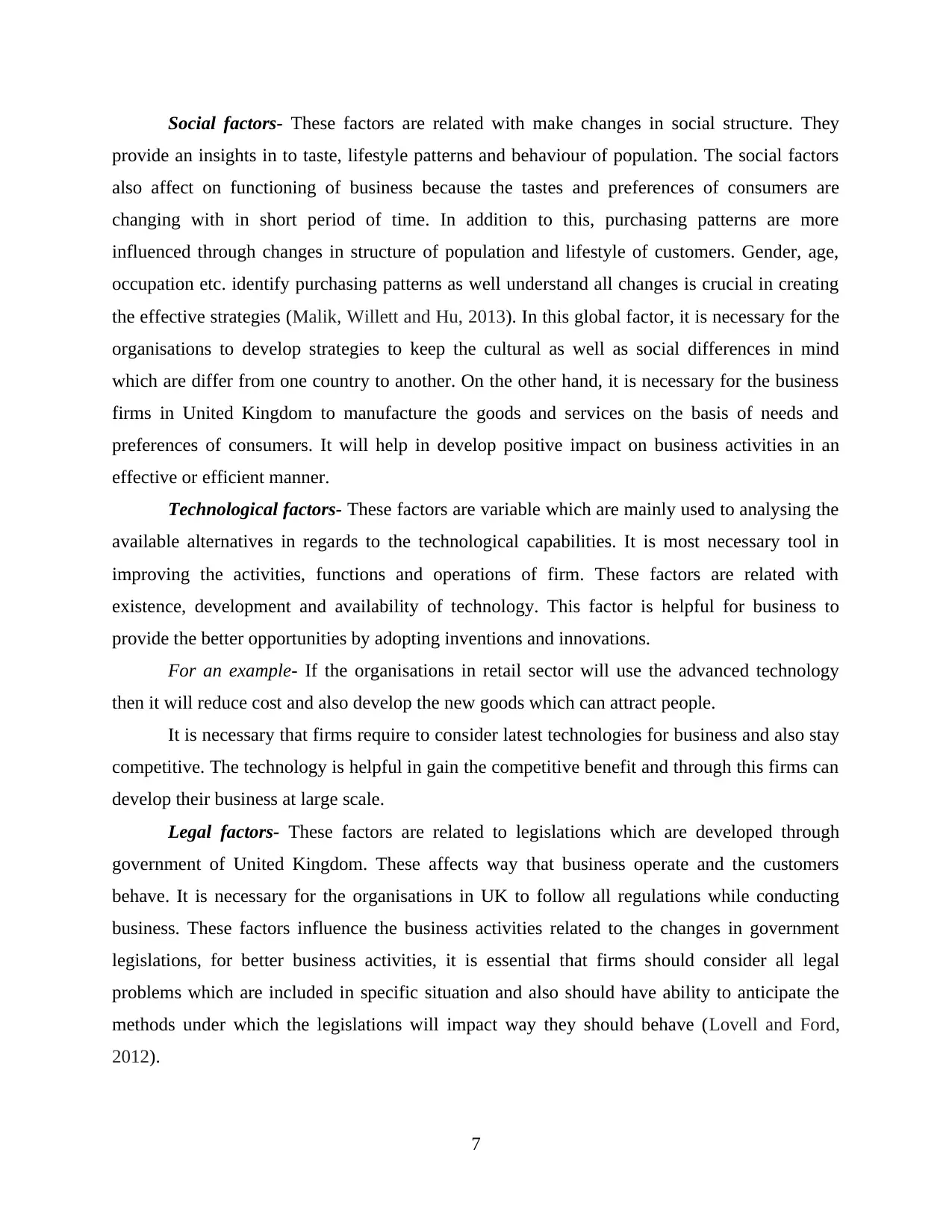
Social factors- These factors are related with make changes in social structure. They
provide an insights in to taste, lifestyle patterns and behaviour of population. The social factors
also affect on functioning of business because the tastes and preferences of consumers are
changing with in short period of time. In addition to this, purchasing patterns are more
influenced through changes in structure of population and lifestyle of customers. Gender, age,
occupation etc. identify purchasing patterns as well understand all changes is crucial in creating
the effective strategies (Malik, Willett and Hu, 2013). In this global factor, it is necessary for the
organisations to develop strategies to keep the cultural as well as social differences in mind
which are differ from one country to another. On the other hand, it is necessary for the business
firms in United Kingdom to manufacture the goods and services on the basis of needs and
preferences of consumers. It will help in develop positive impact on business activities in an
effective or efficient manner.
Technological factors- These factors are variable which are mainly used to analysing the
available alternatives in regards to the technological capabilities. It is most necessary tool in
improving the activities, functions and operations of firm. These factors are related with
existence, development and availability of technology. This factor is helpful for business to
provide the better opportunities by adopting inventions and innovations.
For an example- If the organisations in retail sector will use the advanced technology
then it will reduce cost and also develop the new goods which can attract people.
It is necessary that firms require to consider latest technologies for business and also stay
competitive. The technology is helpful in gain the competitive benefit and through this firms can
develop their business at large scale.
Legal factors- These factors are related to legislations which are developed through
government of United Kingdom. These affects way that business operate and the customers
behave. It is necessary for the organisations in UK to follow all regulations while conducting
business. These factors influence the business activities related to the changes in government
legislations, for better business activities, it is essential that firms should consider all legal
problems which are included in specific situation and also should have ability to anticipate the
methods under which the legislations will impact way they should behave (Lovell and Ford,
2012).
7
provide an insights in to taste, lifestyle patterns and behaviour of population. The social factors
also affect on functioning of business because the tastes and preferences of consumers are
changing with in short period of time. In addition to this, purchasing patterns are more
influenced through changes in structure of population and lifestyle of customers. Gender, age,
occupation etc. identify purchasing patterns as well understand all changes is crucial in creating
the effective strategies (Malik, Willett and Hu, 2013). In this global factor, it is necessary for the
organisations to develop strategies to keep the cultural as well as social differences in mind
which are differ from one country to another. On the other hand, it is necessary for the business
firms in United Kingdom to manufacture the goods and services on the basis of needs and
preferences of consumers. It will help in develop positive impact on business activities in an
effective or efficient manner.
Technological factors- These factors are variable which are mainly used to analysing the
available alternatives in regards to the technological capabilities. It is most necessary tool in
improving the activities, functions and operations of firm. These factors are related with
existence, development and availability of technology. This factor is helpful for business to
provide the better opportunities by adopting inventions and innovations.
For an example- If the organisations in retail sector will use the advanced technology
then it will reduce cost and also develop the new goods which can attract people.
It is necessary that firms require to consider latest technologies for business and also stay
competitive. The technology is helpful in gain the competitive benefit and through this firms can
develop their business at large scale.
Legal factors- These factors are related to legislations which are developed through
government of United Kingdom. These affects way that business operate and the customers
behave. It is necessary for the organisations in UK to follow all regulations while conducting
business. These factors influence the business activities related to the changes in government
legislations, for better business activities, it is essential that firms should consider all legal
problems which are included in specific situation and also should have ability to anticipate the
methods under which the legislations will impact way they should behave (Lovell and Ford,
2012).
7
⊘ This is a preview!⊘
Do you want full access?
Subscribe today to unlock all pages.

Trusted by 1+ million students worldwide
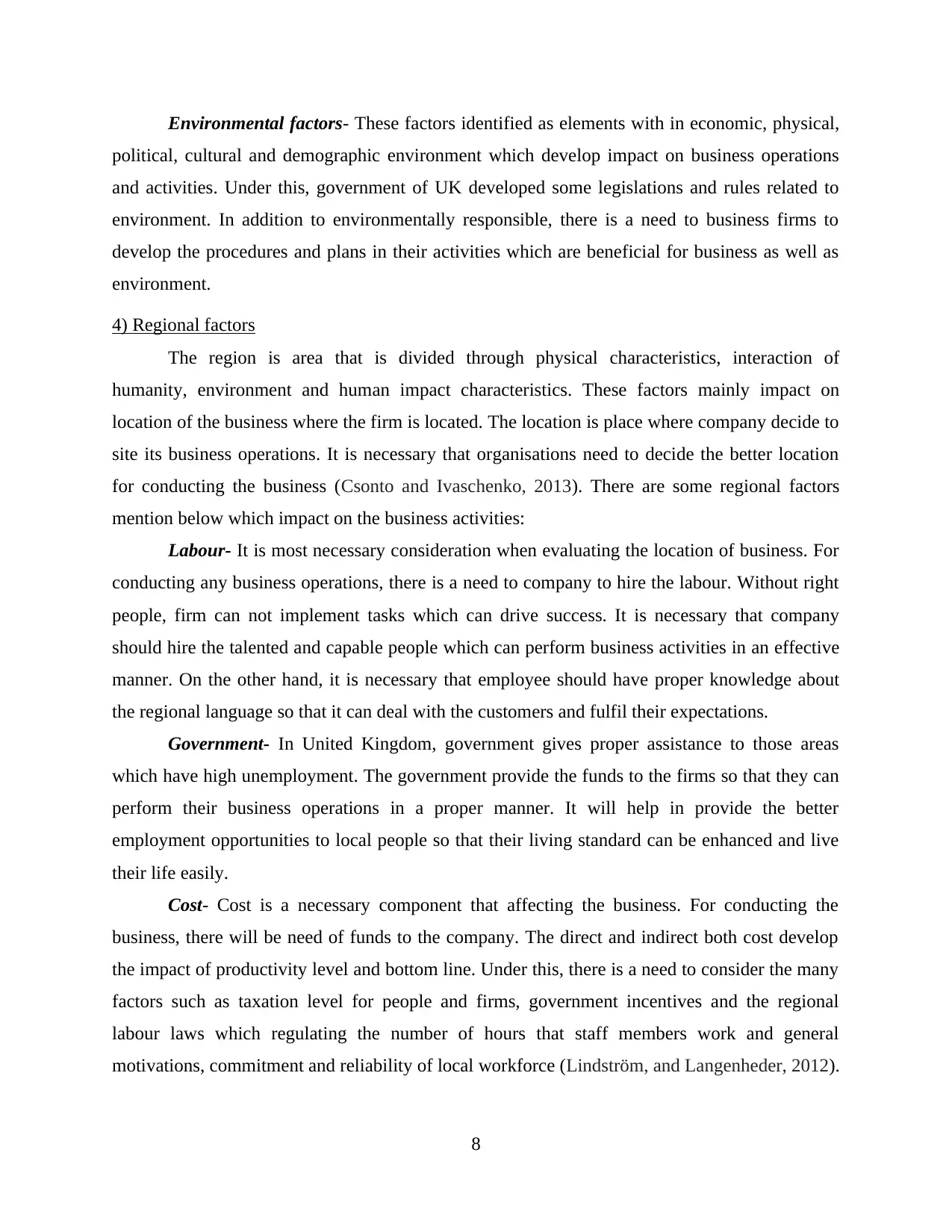
Environmental factors- These factors identified as elements with in economic, physical,
political, cultural and demographic environment which develop impact on business operations
and activities. Under this, government of UK developed some legislations and rules related to
environment. In addition to environmentally responsible, there is a need to business firms to
develop the procedures and plans in their activities which are beneficial for business as well as
environment.
4) Regional factors
The region is area that is divided through physical characteristics, interaction of
humanity, environment and human impact characteristics. These factors mainly impact on
location of the business where the firm is located. The location is place where company decide to
site its business operations. It is necessary that organisations need to decide the better location
for conducting the business (Csonto and Ivaschenko, 2013). There are some regional factors
mention below which impact on the business activities:
Labour- It is most necessary consideration when evaluating the location of business. For
conducting any business operations, there is a need to company to hire the labour. Without right
people, firm can not implement tasks which can drive success. It is necessary that company
should hire the talented and capable people which can perform business activities in an effective
manner. On the other hand, it is necessary that employee should have proper knowledge about
the regional language so that it can deal with the customers and fulfil their expectations.
Government- In United Kingdom, government gives proper assistance to those areas
which have high unemployment. The government provide the funds to the firms so that they can
perform their business operations in a proper manner. It will help in provide the better
employment opportunities to local people so that their living standard can be enhanced and live
their life easily.
Cost- Cost is a necessary component that affecting the business. For conducting the
business, there will be need of funds to the company. The direct and indirect both cost develop
the impact of productivity level and bottom line. Under this, there is a need to consider the many
factors such as taxation level for people and firms, government incentives and the regional
labour laws which regulating the number of hours that staff members work and general
motivations, commitment and reliability of local workforce (Lindström, and Langenheder, 2012).
8
political, cultural and demographic environment which develop impact on business operations
and activities. Under this, government of UK developed some legislations and rules related to
environment. In addition to environmentally responsible, there is a need to business firms to
develop the procedures and plans in their activities which are beneficial for business as well as
environment.
4) Regional factors
The region is area that is divided through physical characteristics, interaction of
humanity, environment and human impact characteristics. These factors mainly impact on
location of the business where the firm is located. The location is place where company decide to
site its business operations. It is necessary that organisations need to decide the better location
for conducting the business (Csonto and Ivaschenko, 2013). There are some regional factors
mention below which impact on the business activities:
Labour- It is most necessary consideration when evaluating the location of business. For
conducting any business operations, there is a need to company to hire the labour. Without right
people, firm can not implement tasks which can drive success. It is necessary that company
should hire the talented and capable people which can perform business activities in an effective
manner. On the other hand, it is necessary that employee should have proper knowledge about
the regional language so that it can deal with the customers and fulfil their expectations.
Government- In United Kingdom, government gives proper assistance to those areas
which have high unemployment. The government provide the funds to the firms so that they can
perform their business operations in a proper manner. It will help in provide the better
employment opportunities to local people so that their living standard can be enhanced and live
their life easily.
Cost- Cost is a necessary component that affecting the business. For conducting the
business, there will be need of funds to the company. The direct and indirect both cost develop
the impact of productivity level and bottom line. Under this, there is a need to consider the many
factors such as taxation level for people and firms, government incentives and the regional
labour laws which regulating the number of hours that staff members work and general
motivations, commitment and reliability of local workforce (Lindström, and Langenheder, 2012).
8
Paraphrase This Document
Need a fresh take? Get an instant paraphrase of this document with our AI Paraphraser

Geographical factors- Under this, geographical conditions which develop the impact on
decision as to kind of industries as well as business in order to carried in region. It is only
because of the same taste, needs and preferences. Mainly the good which are more preferred
through people in one region not liked in other region.
For an example- Likes, preferences, taste etc. as to products consumption in people of
London many not same in The South-east.
On the other hand, economic growth rate in any country is based on better availability of
natural resources. So, government of United Kingdom prevent organisations from any risk which
exploiting scare resources (Dressler, Loewen and Nelles, 2012).
Regional policy- At the European Union level, government provide money to support the
regions of more unemployment as well as social deprivation. Under this, regional policy set fr
compensate for fact that with development of more necessary part of European Union.
Inflation policy- In this, government seeks to assure that there are not sudden
enhancement in cost. They will only do this by Monetary Policy Committee (MPC) of Bank of
England that set interest rate (O'Donnell and et. al., 2016). These can be put up only in case of
danger of spending and borrowing much and pushing the cost up. Increasing interest rate will
make more expensive for business in order to borrow the money.
CONCLUSION
It has been recommended from the above mention report that business environment
consists internal and external factors which develop the negative or positive impact on the
business activities. There has been studied about the fiscal policies that help in enhance the
employment and also maintain healthy money value. It assess in managing an economy of
country. The global factors provide the shape to the business activities and their main reason is to
considering the global factors are analyse external environmental factors which affect the
business activities of organisations in United Kingdom.
9
decision as to kind of industries as well as business in order to carried in region. It is only
because of the same taste, needs and preferences. Mainly the good which are more preferred
through people in one region not liked in other region.
For an example- Likes, preferences, taste etc. as to products consumption in people of
London many not same in The South-east.
On the other hand, economic growth rate in any country is based on better availability of
natural resources. So, government of United Kingdom prevent organisations from any risk which
exploiting scare resources (Dressler, Loewen and Nelles, 2012).
Regional policy- At the European Union level, government provide money to support the
regions of more unemployment as well as social deprivation. Under this, regional policy set fr
compensate for fact that with development of more necessary part of European Union.
Inflation policy- In this, government seeks to assure that there are not sudden
enhancement in cost. They will only do this by Monetary Policy Committee (MPC) of Bank of
England that set interest rate (O'Donnell and et. al., 2016). These can be put up only in case of
danger of spending and borrowing much and pushing the cost up. Increasing interest rate will
make more expensive for business in order to borrow the money.
CONCLUSION
It has been recommended from the above mention report that business environment
consists internal and external factors which develop the negative or positive impact on the
business activities. There has been studied about the fiscal policies that help in enhance the
employment and also maintain healthy money value. It assess in managing an economy of
country. The global factors provide the shape to the business activities and their main reason is to
considering the global factors are analyse external environmental factors which affect the
business activities of organisations in United Kingdom.
9
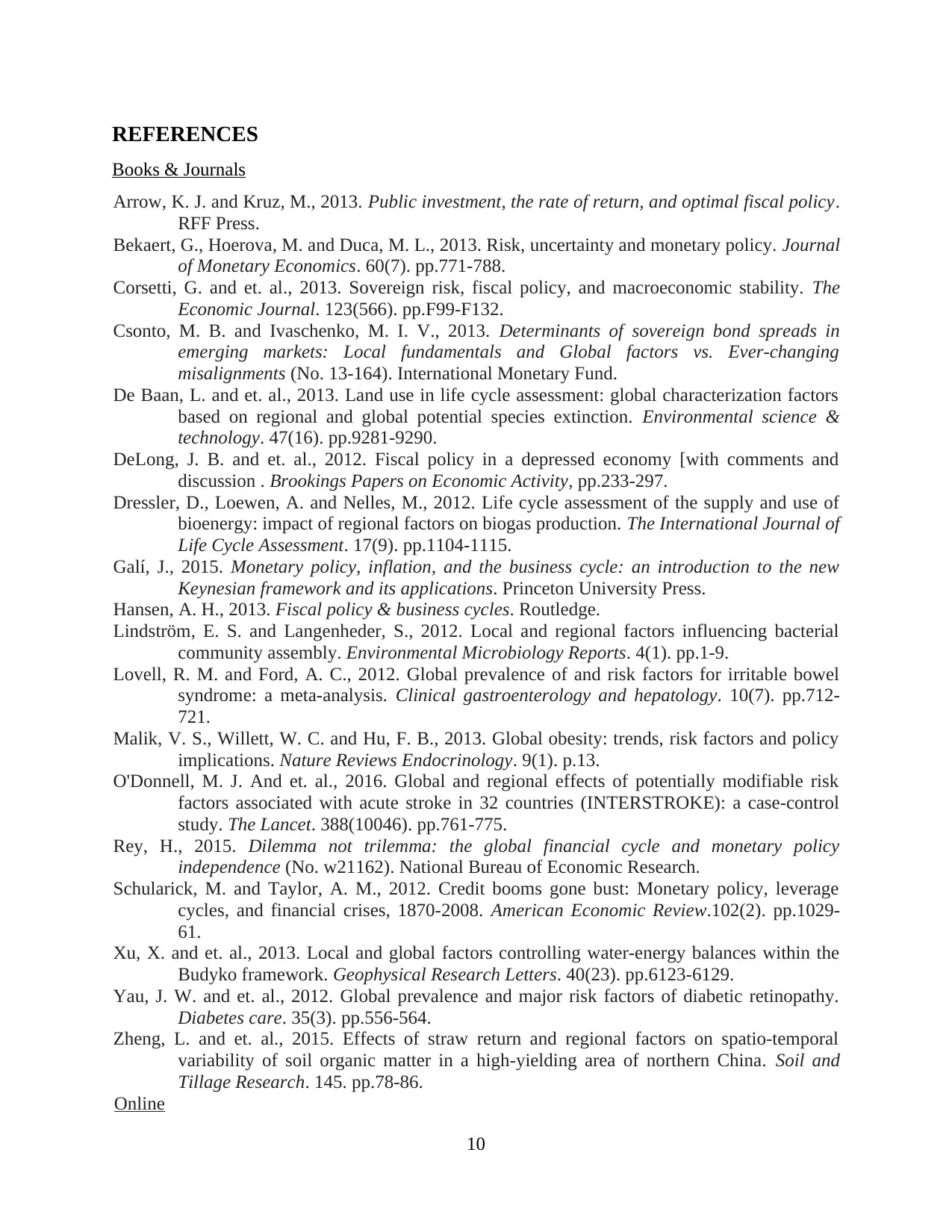
REFERENCES
Books & Journals
Arrow, K. J. and Kruz, M., 2013. Public investment, the rate of return, and optimal fiscal policy.
RFF Press.
Bekaert, G., Hoerova, M. and Duca, M. L., 2013. Risk, uncertainty and monetary policy. Journal
of Monetary Economics. 60(7). pp.771-788.
Corsetti, G. and et. al., 2013. Sovereign risk, fiscal policy, and macroeconomic stability. The
Economic Journal. 123(566). pp.F99-F132.
Csonto, M. B. and Ivaschenko, M. I. V., 2013. Determinants of sovereign bond spreads in
emerging markets: Local fundamentals and Global factors vs. Ever-changing
misalignments (No. 13-164). International Monetary Fund.
De Baan, L. and et. al., 2013. Land use in life cycle assessment: global characterization factors
based on regional and global potential species extinction. Environmental science &
technology. 47(16). pp.9281-9290.
DeLong, J. B. and et. al., 2012. Fiscal policy in a depressed economy [with comments and
discussion . Brookings Papers on Economic Activity, pp.233-297.
Dressler, D., Loewen, A. and Nelles, M., 2012. Life cycle assessment of the supply and use of
bioenergy: impact of regional factors on biogas production. The International Journal of
Life Cycle Assessment. 17(9). pp.1104-1115.
Galí, J., 2015. Monetary policy, inflation, and the business cycle: an introduction to the new
Keynesian framework and its applications. Princeton University Press.
Hansen, A. H., 2013. Fiscal policy & business cycles. Routledge.
Lindström, E. S. and Langenheder, S., 2012. Local and regional factors influencing bacterial
community assembly. Environmental Microbiology Reports. 4(1). pp.1-9.
Lovell, R. M. and Ford, A. C., 2012. Global prevalence of and risk factors for irritable bowel
syndrome: a meta-analysis. Clinical gastroenterology and hepatology. 10(7). pp.712-
721.
Malik, V. S., Willett, W. C. and Hu, F. B., 2013. Global obesity: trends, risk factors and policy
implications. Nature Reviews Endocrinology. 9(1). p.13.
O'Donnell, M. J. And et. al., 2016. Global and regional effects of potentially modifiable risk
factors associated with acute stroke in 32 countries (INTERSTROKE): a case-control
study. The Lancet. 388(10046). pp.761-775.
Rey, H., 2015. Dilemma not trilemma: the global financial cycle and monetary policy
independence (No. w21162). National Bureau of Economic Research.
Schularick, M. and Taylor, A. M., 2012. Credit booms gone bust: Monetary policy, leverage
cycles, and financial crises, 1870-2008. American Economic Review.102(2). pp.1029-
61.
Xu, X. and et. al., 2013. Local and global factors controlling water‐energy balances within the
Budyko framework. Geophysical Research Letters. 40(23). pp.6123-6129.
Yau, J. W. and et. al., 2012. Global prevalence and major risk factors of diabetic retinopathy.
Diabetes care. 35(3). pp.556-564.
Zheng, L. and et. al., 2015. Effects of straw return and regional factors on spatio-temporal
variability of soil organic matter in a high-yielding area of northern China. Soil and
Tillage Research. 145. pp.78-86.
Online
10
Books & Journals
Arrow, K. J. and Kruz, M., 2013. Public investment, the rate of return, and optimal fiscal policy.
RFF Press.
Bekaert, G., Hoerova, M. and Duca, M. L., 2013. Risk, uncertainty and monetary policy. Journal
of Monetary Economics. 60(7). pp.771-788.
Corsetti, G. and et. al., 2013. Sovereign risk, fiscal policy, and macroeconomic stability. The
Economic Journal. 123(566). pp.F99-F132.
Csonto, M. B. and Ivaschenko, M. I. V., 2013. Determinants of sovereign bond spreads in
emerging markets: Local fundamentals and Global factors vs. Ever-changing
misalignments (No. 13-164). International Monetary Fund.
De Baan, L. and et. al., 2013. Land use in life cycle assessment: global characterization factors
based on regional and global potential species extinction. Environmental science &
technology. 47(16). pp.9281-9290.
DeLong, J. B. and et. al., 2012. Fiscal policy in a depressed economy [with comments and
discussion . Brookings Papers on Economic Activity, pp.233-297.
Dressler, D., Loewen, A. and Nelles, M., 2012. Life cycle assessment of the supply and use of
bioenergy: impact of regional factors on biogas production. The International Journal of
Life Cycle Assessment. 17(9). pp.1104-1115.
Galí, J., 2015. Monetary policy, inflation, and the business cycle: an introduction to the new
Keynesian framework and its applications. Princeton University Press.
Hansen, A. H., 2013. Fiscal policy & business cycles. Routledge.
Lindström, E. S. and Langenheder, S., 2012. Local and regional factors influencing bacterial
community assembly. Environmental Microbiology Reports. 4(1). pp.1-9.
Lovell, R. M. and Ford, A. C., 2012. Global prevalence of and risk factors for irritable bowel
syndrome: a meta-analysis. Clinical gastroenterology and hepatology. 10(7). pp.712-
721.
Malik, V. S., Willett, W. C. and Hu, F. B., 2013. Global obesity: trends, risk factors and policy
implications. Nature Reviews Endocrinology. 9(1). p.13.
O'Donnell, M. J. And et. al., 2016. Global and regional effects of potentially modifiable risk
factors associated with acute stroke in 32 countries (INTERSTROKE): a case-control
study. The Lancet. 388(10046). pp.761-775.
Rey, H., 2015. Dilemma not trilemma: the global financial cycle and monetary policy
independence (No. w21162). National Bureau of Economic Research.
Schularick, M. and Taylor, A. M., 2012. Credit booms gone bust: Monetary policy, leverage
cycles, and financial crises, 1870-2008. American Economic Review.102(2). pp.1029-
61.
Xu, X. and et. al., 2013. Local and global factors controlling water‐energy balances within the
Budyko framework. Geophysical Research Letters. 40(23). pp.6123-6129.
Yau, J. W. and et. al., 2012. Global prevalence and major risk factors of diabetic retinopathy.
Diabetes care. 35(3). pp.556-564.
Zheng, L. and et. al., 2015. Effects of straw return and regional factors on spatio-temporal
variability of soil organic matter in a high-yielding area of northern China. Soil and
Tillage Research. 145. pp.78-86.
Online
10
⊘ This is a preview!⊘
Do you want full access?
Subscribe today to unlock all pages.

Trusted by 1+ million students worldwide
1 out of 14
Related Documents
Your All-in-One AI-Powered Toolkit for Academic Success.
+13062052269
info@desklib.com
Available 24*7 on WhatsApp / Email
![[object Object]](/_next/static/media/star-bottom.7253800d.svg)
Unlock your academic potential
Copyright © 2020–2026 A2Z Services. All Rights Reserved. Developed and managed by ZUCOL.




